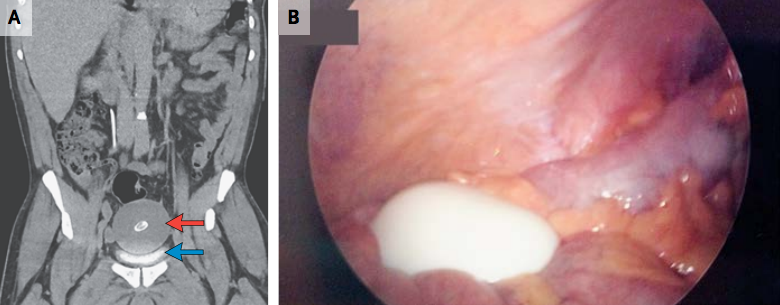When a 62-year-old man showed up to have an evaluation of his urinary frequency - apparently it'd been abnormal for about 20 years - he probably wasn't expecting the monstrosity pictured above to be located in his abdomen.
Described in The New England Journal of Medicine in 2015 as a "free-floating, smooth, firm, rubbery mass measuring 10 cm (3.9 inches) by 9.5 cm by 7.5 cm (3.9 x 3.7 x 3 inches) and weighing 220 g (0.5 pounds)," this giant 'boiled egg' managed to avoid detection through both physical examination and laboratory analysis.
But a computed tomography scan of the area (see below) betrayed its very clever hiding spot.
Called peritoneal loose bodies, these masses are extremely rare, and only show up in the scientific literature a handful of times.
They're also known as peritoneal mice (no idea why, mice aren't smooth and round), and they usually only turn up as an incidental finding during abdominal surgery or an autopsy.
They're called loose bodies, because they move around quite freely inside their host - one report from 2011 noted that a man's peritoneal loose body had moved from the left side of his pelvis to the right in just nine days.
The particular specimen, which you can see dyed green on the right-hand-side of the top image, was composed predominantly of acellular, fibrous tissue, surrounded by a ring of calcification, none of which you really need floating around inside you.
Once it was removed, the man got back his regular urinary frequency.
 (Rachael Sussman et al)
(Rachael Sussman et al)
While the pathology of peritoneal loose bodies is not entirely clear, it's thought that he most common causes are link to the twisting and separation of the appendices epiploicae - small pouches filled with fat in the membrane that forms the lining of the abdominal cavity.
They're found in the membrane running along the colon, but not in the rectum. Interestingly, most of the literature about these masses reports instances of men over 50, who were otherwise healthy, having harboured them.
The images below are from when a peritoneal loose body was removed from a 64-year-old Indian man who was referred to doctors with complaints of abdominal pain, vomiting and not farting or pooping for four days.
Just one more thing for all you hypochondriacs out there to worry about.
 (Sewkani et al. Journal of Medical Case Reports 2011)
(Sewkani et al. Journal of Medical Case Reports 2011)
A version of this article was first published in April 2015.
